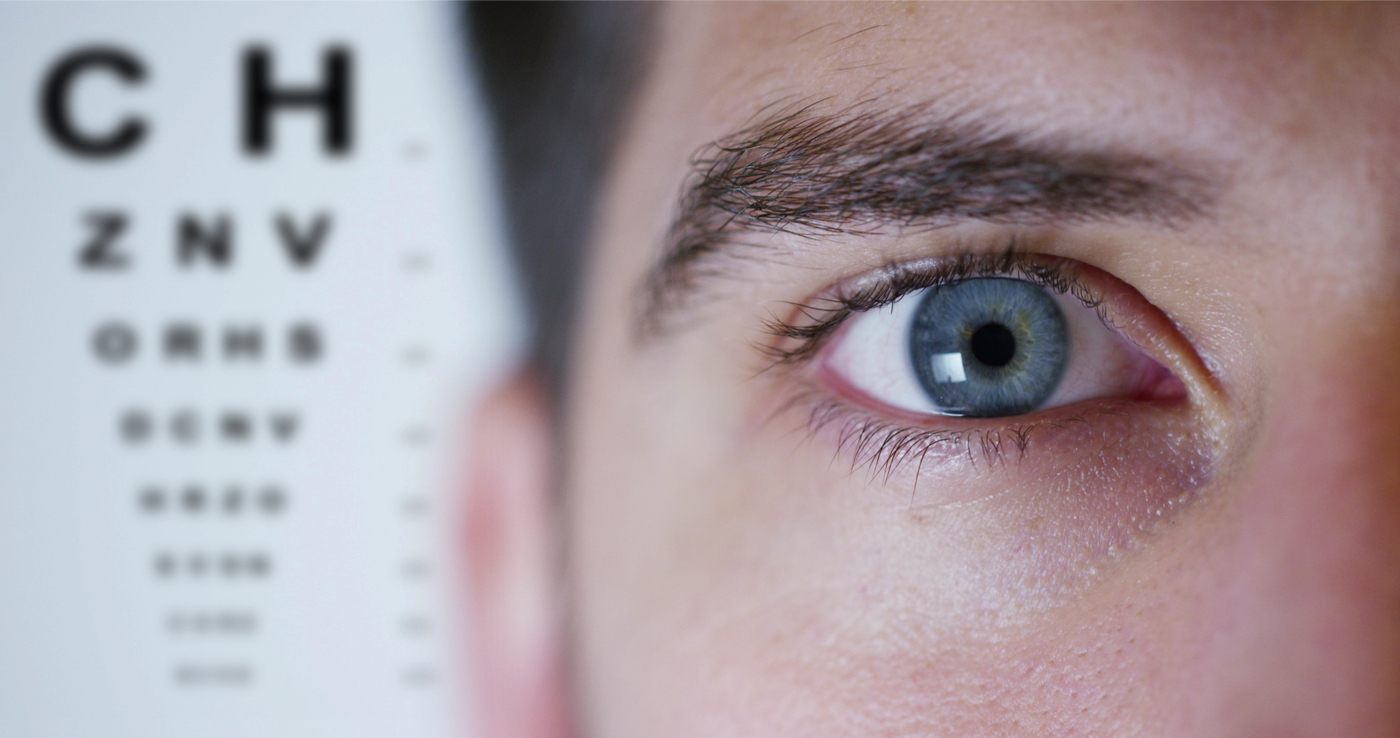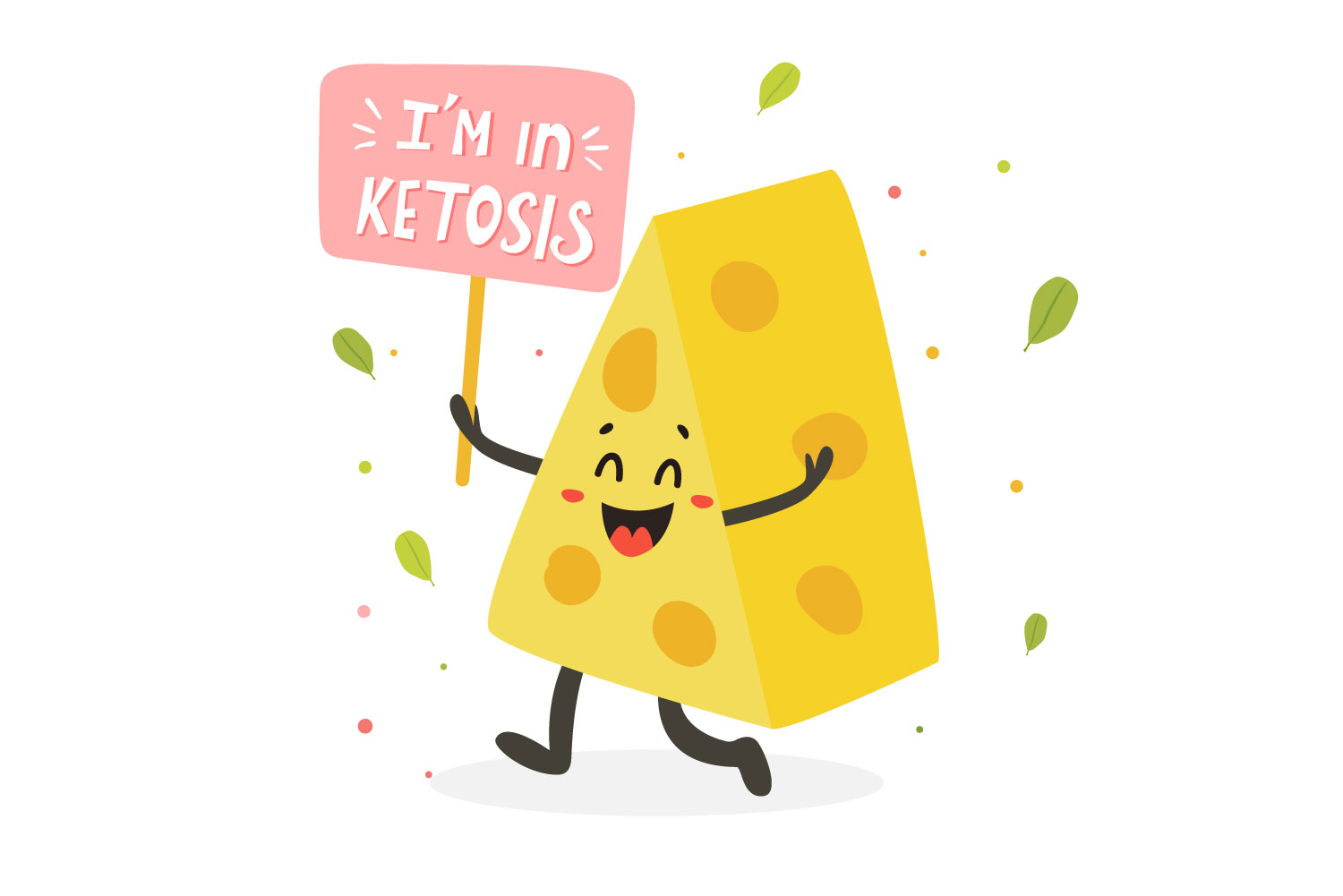SUMMARY
You have more power than you might realize when it comes to eye health and vision clarity. Want to learn how to improve eyesight naturally? The answer lies with taking care of your overall health and making sure you ingest enough eye-supporting nutrients such as lutein and vitamin C.
Good eyesight isn’t always a luck-of-the-draw situation.
Sure, some people are born with it. But that doesn’t mean they get to keep it for life.
If you currently have decent vision, there are steps you can take to help ensure that it stays that way.
What if your eyesight is already less than stellar? In certain cases, you may be able to improve it naturally by following certain guidance.
It may sound too good to be true, but it makes sense when you consider that your eyesight is just another aspect of your health. In many cases, your vision will improve or deteriorate based on certain broader health and lifestyle choices.
That means if you want to learn how to improve eyesight naturally, you have to start by looking at your wellness from a holistic perspective.
In this article, we will:
- Explain some symptoms of vision problems
- Discuss diseases and conditions that cause poor vision
- Give you the scoop on other factors that can lead to a vision problem
- List steps you can take to preserve and/or improve your eyesight
How can I tell if I have a vision problem?
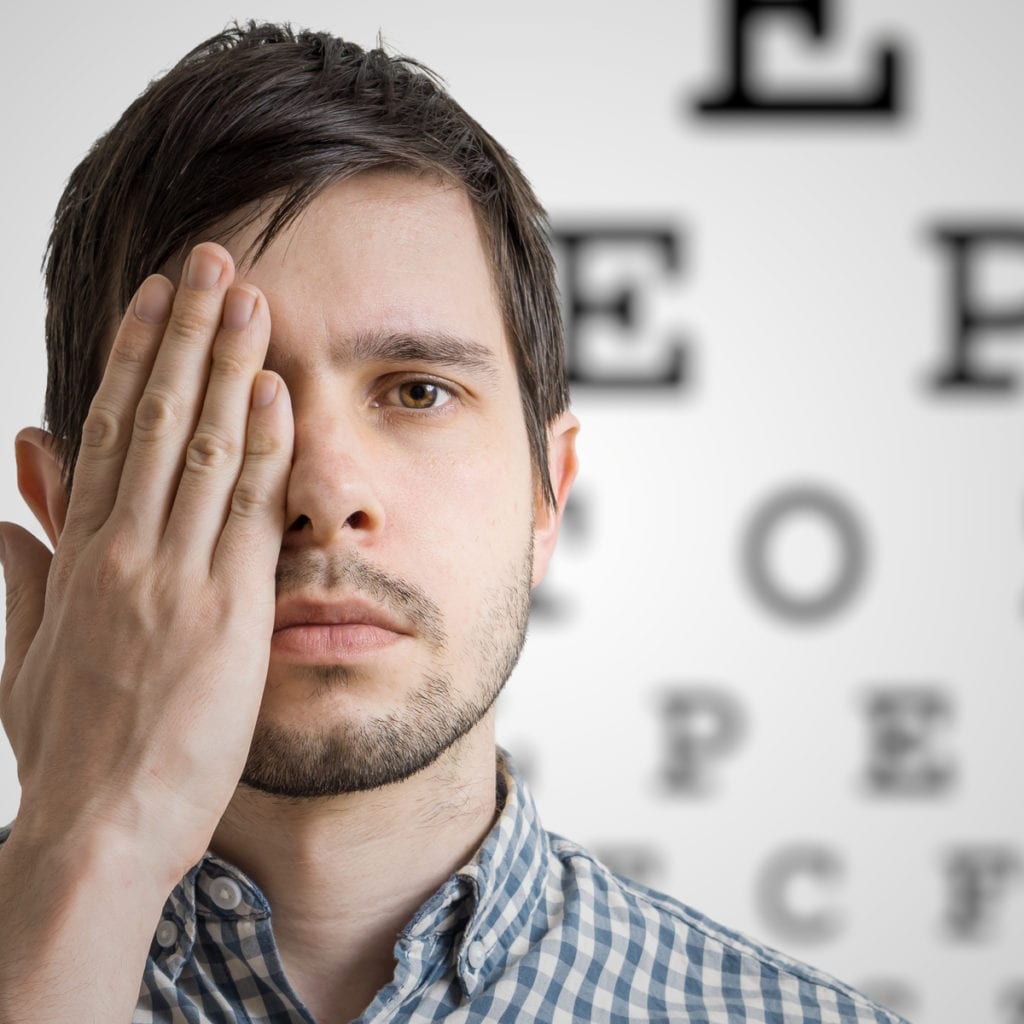
If your vision is deteriorating, this can present itself in different ways. Some of the signs may not be immediately obvious; therefore, they might be easy to overlook.
Here are some common symptoms that may indicate a vision problem:
1. Blurry vision that gets worse when you look at objects that are far away
This is known as nearsightedness or myopia. In many cases, people with this condition have no problem seeing objects that are close to them.
2. Blurry vision when you look at objects that are very close to you
This is known as hyperopia.
3. Double vision
This may happen when viewing objects that are close or far away.
4. Floaters and/or light flashes
The floaters may look like cobwebs or a fly that’s in your peripheral vision. The light flashes may look like lightning streaks.
It’s common for people to see both floaters and light flashes every now and then; in most cases, neither of these things indicates a vision problem. The back part of the eye contains a jelly-like substance known as vitreous, and it sometimes causes you to see floaters and light flashes as it moves around. It’s annoying, but it’s not an issue that requires medical care.
However, the prognosis changes if the issue becomes severe. If you find yourself seeing hundreds of floaters or light flashes with what looks like a black curtain or veil obscuring your vision, see an eye doctor right away. This could indicate that you have a detached retina. Without proper treatment, a detached retina could cause permanent loss of vision.
5. Difficulty seeing at night or in dim light

This is known as night blindness. It can impact your ability to drive safely after dark.
6. Hazy vision
In some cases, hazy vision is worsened by bright light.
7. Blinding glare from bright lights
With this symptom, sunlight seems uncomfortably bright. Also, when driving at night, the glare of oncoming headlights can be blinding.
8. A need for brighter light when reading

If you find yourself needing a brighter light than usual when reading, it may indicate a vision problem.
9. Opaque pupils
Changes in the appearance of your pupils shouldn’t be ignored. If your normally dark pupil has begun to look milky white or opaque, see an eye doctor. This could indicate an advanced case of cataracts.
10. Painful inflammation
If your eyes suffer painful inflammation or pressure, seek medical care. Again, this may indicate an advanced case of cataracts.
Eye diseases and conditions that cause poor vision
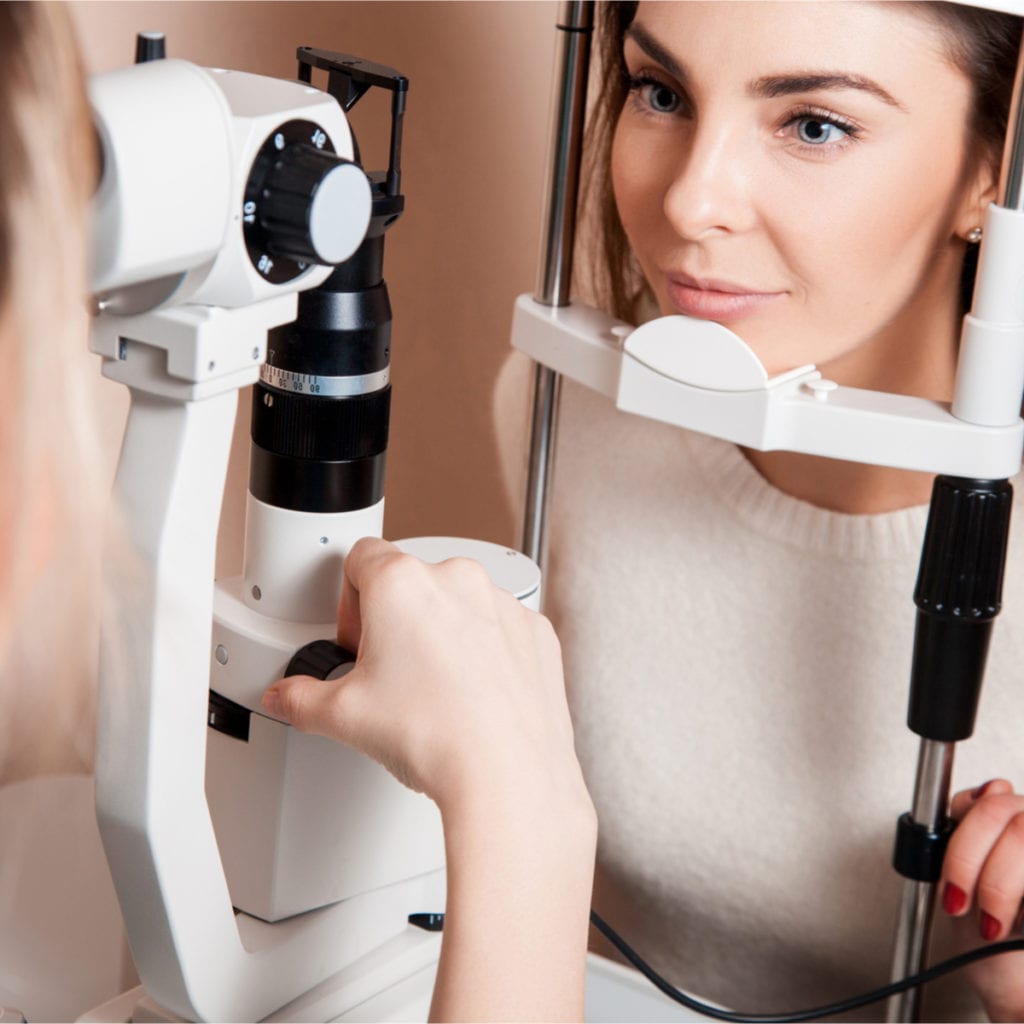
Before exploring how to improve eyesight, it can be helpful to have an understanding of common eyes diseases.
These eye diseases and conditions can negatively impact your vision:
Macular degeneration
This condition affects the retina, a part of the eye that’s responsible for making sure images are properly focused. When macular degeneration occurs, it causes blurred vision. This can make reading difficult. In some cases, there may be a blind spot at the center of your field of vision.
Macular degeneration is age-related, and it’s the leading cause of blindness in people over 50. According to the American Optometric Association, this condition affects about 1.6 million Americans.
Its exact cause is unknown, but age is clearly a factor. Cigarette smoking and nutrition also seem to play a role in its development.
Cataracts
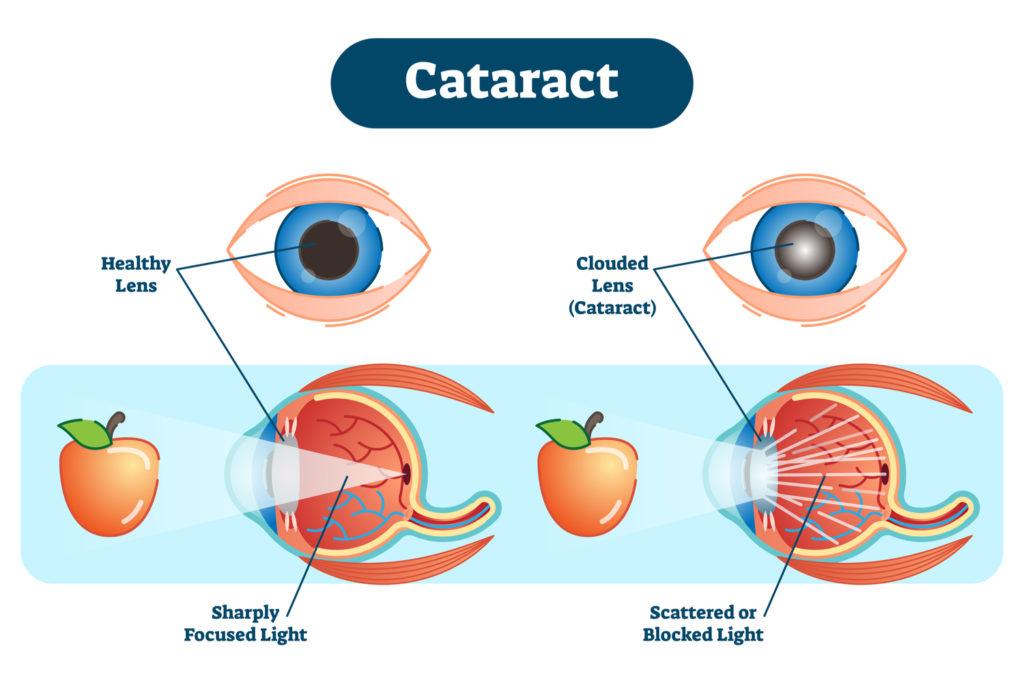
Cataracts cause the lens inside the eye to become cloudy. This makes it difficult for light to reach the retina at the back of the eye, and the end result is blurred, cloudy vision. Cataracts may also make your vision less colorful than it normally is.
A cataract can be caused by:
- Aging
- Long-term exposure to the sun’s ultraviolet rays
- Disease
- Injury
- Inherited conditions
Older people are at higher risk for cataracts. People who fall within these groups are also at higher-than-normal risk:
- Smokers
- Diabetics
- Heavy alcohol drinkers
- People with a family history of cataracts
- Those who have had an eye injury, eye surgery or radiation treatment on the upper body
- People who’ve spent lots of time in the sun
- Those who’ve taken steroids (a medicine used to treat health problems such as rashes and arthritis)
If your eye is otherwise in good condition, a cataract can be removed via surgery. This process usually involves the insertion of an intraocular lens implant.
Cataract surgery has a high success rate in people whose eyes are otherwise quite healthy. However, if you have other eye diseases in addition to this condition, surgery may not be a viable option.
Glaucoma
Glaucoma is a disease that can damage your eye’s optic nerve. In many cases, this condition develops because fluid within the eye isn’t draining and flowing in a healthy way; this will ultimately create pressure within the eye. Glaucoma can also develop when there is inadequate blood flow to the optic nerve.
One symptom of this disease is poor night vision. Glaucoma can also cause your side (peripheral) vision to deteriorate.
If it’s diagnosed early, glaucoma can often be treated with drugs or surgery.
Diabetic retinopathy
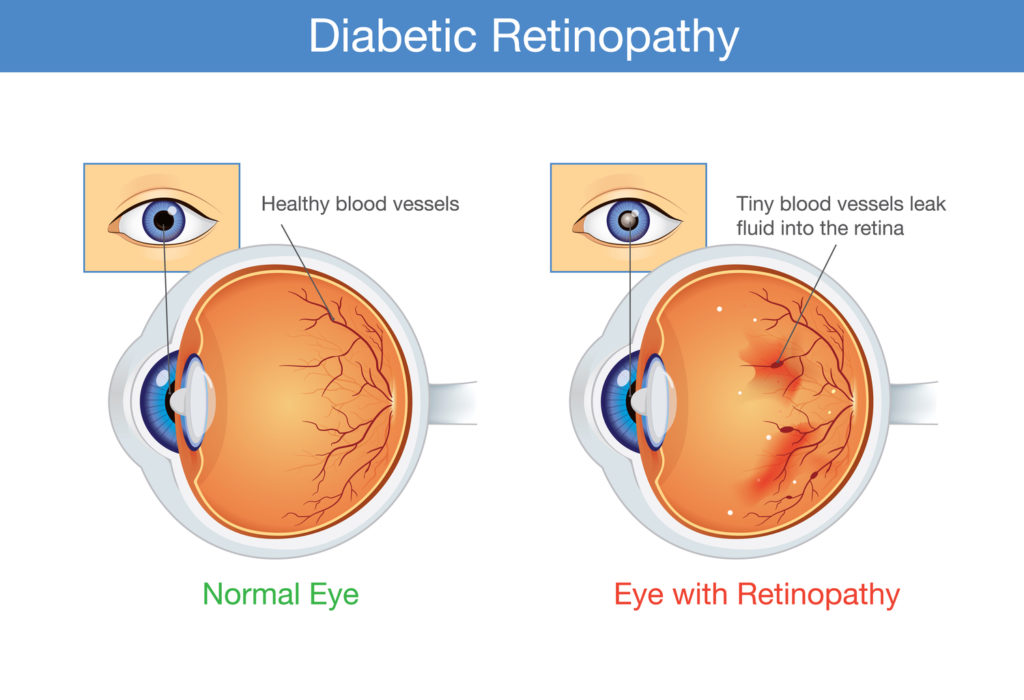
Diabetes can affect your visual functioning, causing vision changes that make it more difficult for you to see clearly.
The eye’s retina relies on blood vessels to feed it with the blood it needs to function properly. Diabetes causes these blood vessels to develop tiny leaks — a condition is known as diabetic retinopathy. These leaks can impair vision and cause severe damage to the retina over time.
Surgical treatments and laser procedures can slow the progress of diabetic retinopathy. However, the best treatment is to address the diabetes that causes this condition. Diabetes is treated by being mindful of blood sugar levels.
Retinitis pigmentosa
Retinitis pigmentosa is a genetic condition that can cause your vision to deteriorate.
Patients inherit this condition from one of their parents. Retinitis pigmentosa can make it difficult to see at night, and it also has a negative impact on your peripheral vision. If peripheral vision worsens, it can cause tunnel vision, a condition in which your field of vision is significantly narrowed.
Night blindness is usually the first symptom of retinitis pigmentosa. It typically shows up in either childhood or adolescence.
Amblyopia
Amblyopia (also known as lazy eye) is a disease in which a person’s eyesight fails to develop normally during childhood.
With this condition, there is a communication breakdown between the brain and the eye, and the brain is unable to recognize sight from one of your eyes. As time passes, the brain relies more heavily on the stronger eye, while vision in the weaker eye deteriorates.
Ultimately, this condition can leave you with blurred vision. Amblyopia isn’t easily corrected with normal glasses or corrective lenses.
Treatment for amblyopia usually involves training the brain to strengthen its communication with the weaker eye.
In some cases, the stronger eye is covered with an eye patch, forcing the brain to use the weaker eye to see.
In other cases, the stronger eye is treated with special eye drops that temporarily blur the vision. As with the eye patch, this treatment method forces the brain to depend on the weaker eye for visual input.
Astigmatism
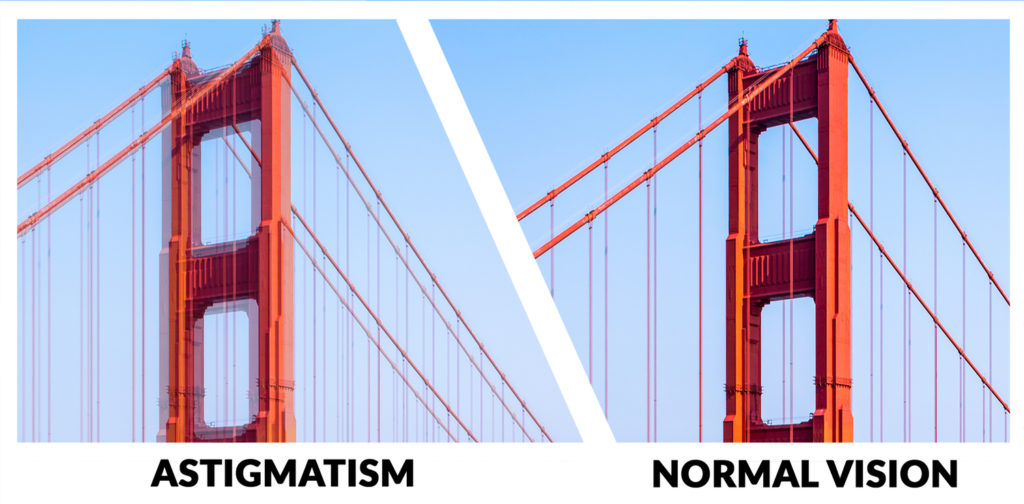
There is a curvature to your eye’s cornea. If the cornea or lens isn’t evenly curved, light won’t be properly refracted, and this can create vision problems. This condition is known as astigmatism.
The eye’s corneal shape often varies from person to person. Because of this, astigmatism is pretty common. This condition can be inherited from your parents. It can also develop after eye injury, eye surgery or an eye disease.
Astigmatism causes these symptoms:
- Blurry vision
- Distorted vision in which objects may appear too tall, too short, too wide or too thin
- Headaches
- Eye discomfort
- Squinting in an effort to see clearly
This condition can be treated with eyeglasses or contact lenses. In some cases, LASIK surgery may be an option.
Detached retina
With a detached retina, your eye’s retina separates from its underlying layer. This can create a complete impairment of your vision.
A detached retina can be caused by holes in the retina or eye trauma. It can also be triggered by infection, a tumor or a blood vessel disturbance.
If your retina becomes detached, it can be surgically reattached. Early treatment is a must. If retinal detachment isn’t promptly addressed, it can cause permanent vision loss.
Acquired (traumatic) brain injury
Head injuries, brain damage or strokes can cause vision loss.
After such an event, you may experience symptoms such as blurred vision, reduced visual acuity and contrast sensitivity. Your depth perception may suffer, and you may experience confusion when performing visual tasks.
Other symptoms include headaches, double vision, difficulty reading, abnormal body posture, glare sensitivity and balance problems.
Other factors that cause poor vision

If you want to learn how to improve eyesight, it’s important to know that poor vision isn’t always caused by an underlying disease. Vision clarity sometimes varies from day to day for a host of reasons. Many people notice that their eyesight is fine on some days and somewhat blurry on others.
What causes this? Here are some factors that can negatively impact your vision from day to day:
Eye strain
If you spend long stretches of time staring at a digital screen, you run the risk of straining your eye muscles, and this can cause blurred vision. This condition is known as digital eye strain or computer vision syndrome. It can happen when you’re staring at your computer screen, and it can also occur when viewing the screen on your smartphone or tablet.
You can help prevent eye strain by taking frequent breaks when viewing digital screens. Give your eyes a rest by closing them, or by looking at something in the distance. Also, try to blink often, since most people tend to blink less frequently when staring at a screen.
Stress

Our eyes communicate with our brains. If we’re stressed, this will have an impact on brain function, and this may ultimately affect the way our eyes perform.
All this can create a chain of events that makes things worse and worse. It starts with the stress creating weak eyesight or blurred vision. Then, the blurred vision causes you to experience more stress.
The best way to treat this is to ease your stress. This can be accomplished via tools such as meditation, exercise, deep breathing and a healthy diet.
Fatigue
If you haven’t gotten enough sleep or are feeling fatigued for some reason, it can have a short-term effect on the quality of your eyesight. If you’ve gotten less than five hours of sleep, you may find that your eyes have difficulty focusing. You may also experience eyes spasms, dry eyes or eye irritation.
The best remedy here is obvious: Get some sleep.
How to preserve or improve your eyesight naturally
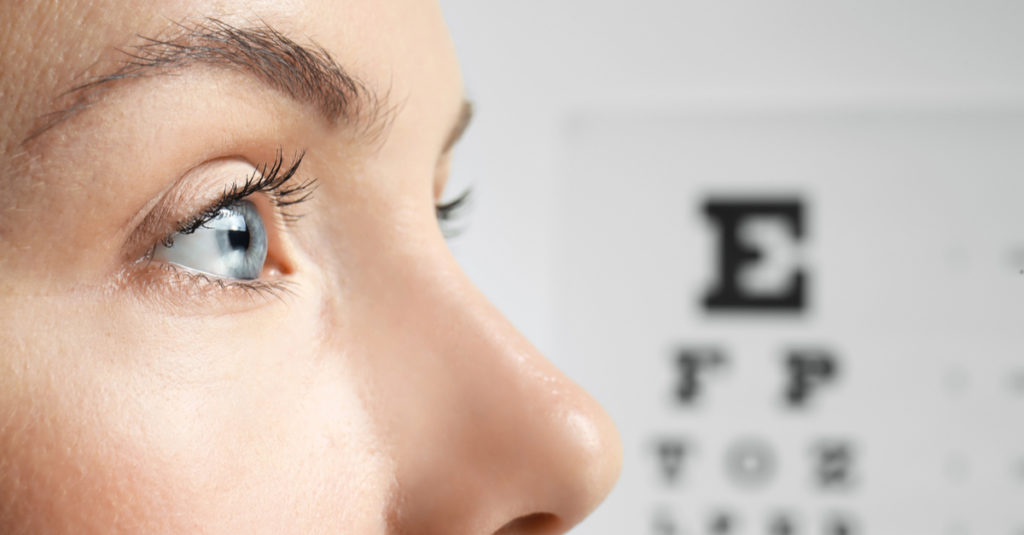
Many people find that their vision gets worse as they get older. There are steps you can take that will help you maintain good eyesight as you age.
What about those cases where a person’s eyesight is already less than optimal? If the underlying cause is a serious eye disease or condition, medical care is your best option. But in other cases, you may find that you’re able to improve your vision by taking a holistic approach that includes diet and lifestyle changes.
Here are some tips that can help you preserve or improve your eyesight naturally:
1. Shield your eyes from the sun

The UV light in the sun’s rays can cause cataracts to develop over time. Sunglasses can help protect your eyes and your vision, so it’s a good idea to wear them when you’re outside. Wearing a hat with a brim is another way to block the sun’s rays when you’re outdoors.
2. Stop smoking
Smokers have a higher-than-normal risk of developing cataracts. If you currently smoke, breaking this habit is one step you can take to protect your eyesight.
3. Avoid excessive alcohol consumption

Heavy drinking has been linked with cataract development. Stick to low, zero or moderate alcohol consumption if you want to preserve your eyesight.
4. Wear protective goggles when performing activities that could harm your eyes
An eye injury can cause problems that have long-term consequences for your vision. Certain activities put your eyes at risk. When engaged in these activities, it’s important to wear protective googles.
It’s a good idea to wear goggles when you’re playing sports such as tennis or racquetball. Its also wise to wear googles if you’re woodworking or performing certain types of car repair in your garage.
Basically, if you’re doing something in which there’s a risk of chemicals, wood shavings, metal shards or any type of object coming in contact with your eyes, protective googles are recommended.
5. Keep your hands and lenses clean
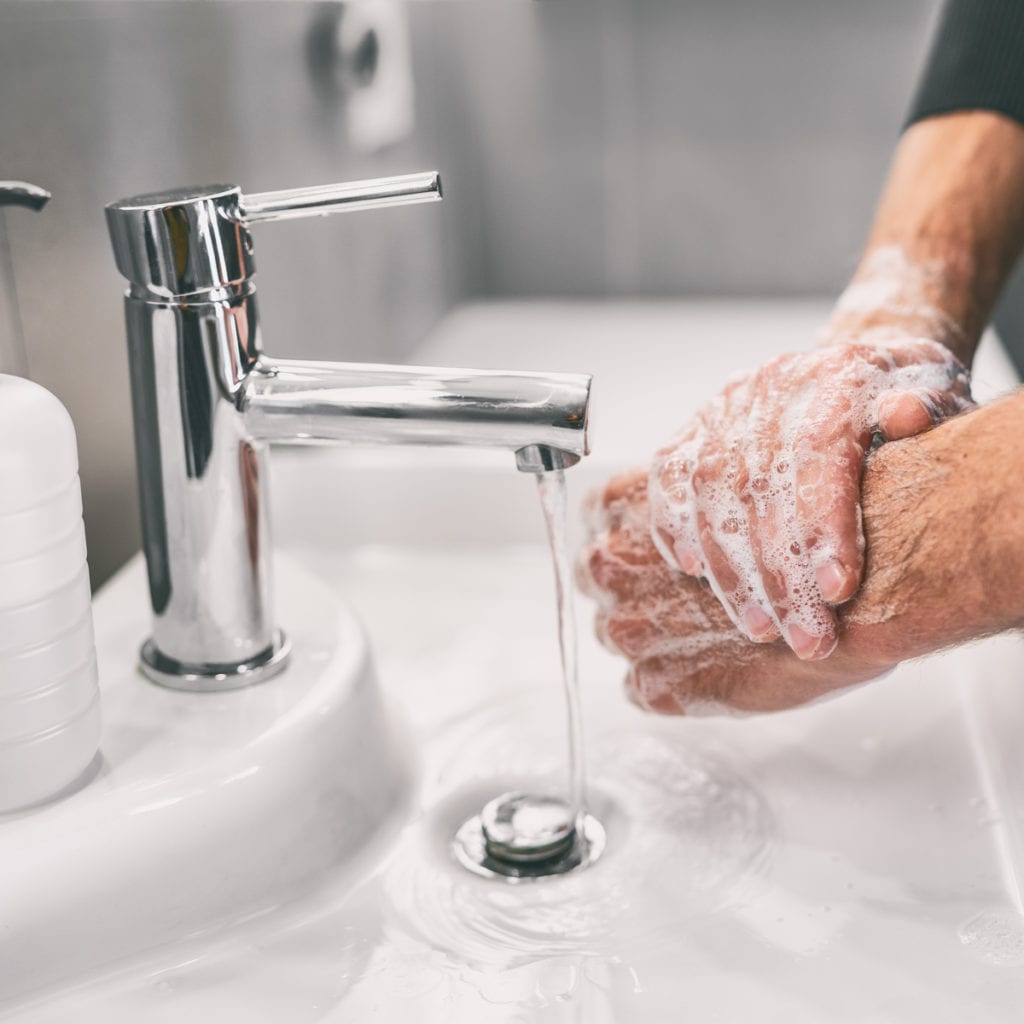
Your eyes are susceptible to germs and infections, and even minor irritants can cause your vision to suffer. To avoid eye infection and irritation, wash your hands before touching your eyes. And always wash your hands prior to handling your contact lenses.
If you wear contacts, it’s important to disinfect and/or replace them per the manufacturer’s recommendations. If germs make their way into your contact lenses, this could ultimately cause you to develop a bacterial infection in your eyes.
6. Eat (and/or supplement) for eye health
According to the American Optometric Association, certain nutrients can help prevent common eye conditions. Here are some nutrients that can help protect your vision:
Zinc, as well as vitamins A, C and E
Zinc – along with vitamins A, C and E – can help stave off macular degeneration. You can find these nutrients in brightly hued foods such as:
- Red peppers
- Carrots
- Broccoli
- Strawberries
- Sweet potatoes
- Spinach
- Citrus fruits
You can also opt to take supplements that contain these essential nutrients.
Lutein and zeaxanthin
Lutein and zeaxanthin are nutrients than can help preserve and improve your eyesight. You’ll find them in these foods:
- Eggs
- Leafy green vegetables
- Zucchini
- Broccoli
There are also supplements available that include lutein and zeaxanthin. Many of these supplements are designed specifically to support healthy vision.
Omega-3 fatty acids
The cells in your retina contain lots of omega-3 fatty acids. These healthy fats aid in the development of retinal cells, and they can also reduce eye inflammation. Studies show that consuming omega-3 fatty acids can help prevent age-related macular degeneration.
You can find these healthy fats in fatty fish such as salmon and cod. They’re also present in nuts and seeds.
7. Regularly check your blood sugar levels
Diabetes can cause diabetic retinopathy, a condition that damages your vision. With diabetes, high blood sugar is a clear causal factor. Monitor your blood sugar levels on a regular basis, and take steps to address the issue if there’s a problem.
8. Stay fit

If you’re overweight or obese, it places you at higher risk for diabetes, and this condition can threaten your eyesight. Stay fit by integrating healthy diet choices with regular exercise.
9. Manage high blood pressure
So far, we’ve talked a lot about diabetes, but this ailment isn’t the only one that can cause your eyesight to deteriorate. High blood pressure can also have negative consequences for your eyesight. Managing this condition may work to protect your vision.
You can manage high blood pressure via exercise, a healthy diet and appropriate medications.
10. Take regular breaks when viewing digital screens
Many of us spend countless hours staring at the screens on our laptops and smartphones. This can cause eye strain. You can prevent this from happening by taking regular breaks when staring at digital screens.
The National Eye Institute recommends that you follow the 20/20/20 rule: Every 20 minutes, give your eyes a rest by gazing at something that’s about 20 feet away for about 20 seconds.
11. Utilize eye exercises
Eye exercises won’t provide any benefit if you have a disease such as macular degeneration or diabetic retinopathy. However, exercises can help to mitigate the blurred vision that sometimes comes with digital eye strain.
Here’s an example of a simple eye exercise that can help soothe eyes that are suffering from digital eye strain:
- Position your thumb 10 inches from your face, and focus on it for 15 seconds.
- Locate an object that’s 10-15 feet away, and focus on it for 15 seconds.
- Return your gaze to your thumb.
- Repeat five times.
Next steps
Now that you know how to improve eyesight and have some knowledge regarding the nutrients that support eye health, invest in supplements that can help your vision. Also, take a look at your overall health to determine if there are changes you can make that could protect your eyesight over the long term. Finally, get regular eye exams, since these may be able to help you identify vision problems before they worsen.
Proper nutrition is a must for healthy eyes. Subscribe to Fresh N Lean to have organic cuisine delivered to your door. We offer meal plans that cater to a broad range of diets. Our dishes contain nourishing foods that are good for your eyes, such as salmon, cod and broccoli.
Fresh N Lean is the nation’s largest organic meal delivery service. Our tasty, chef-prepared cuisine is always fresh and never frozen, and we offer convenient meal plans like Protein+, Keto, Paleo, Standard Vegan and Mediterranean. Choose Fresh N Lean for affordable nutrition, delivered to your doorstep.
